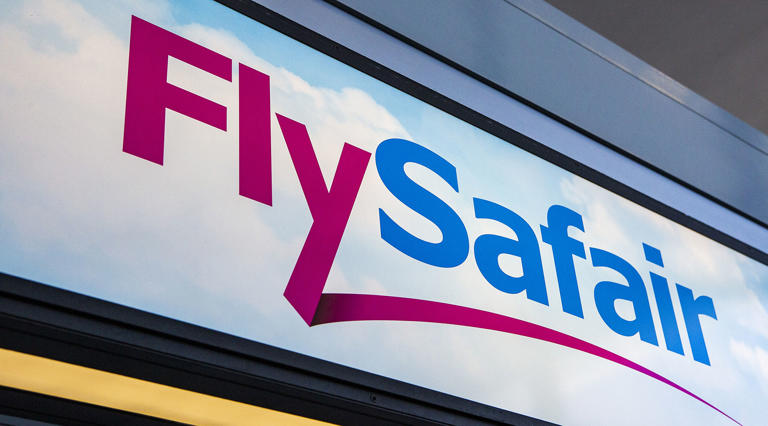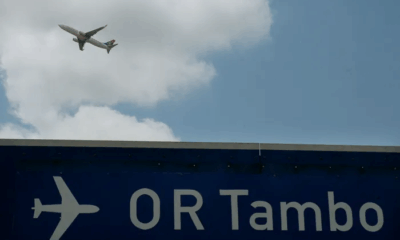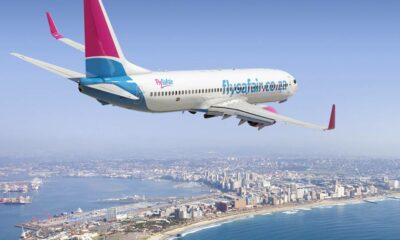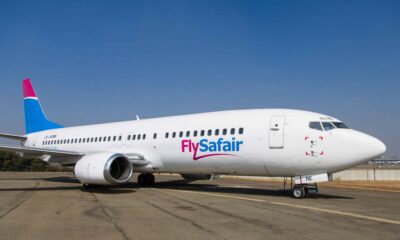Business
Turbulence Ahead: FlySafair Battles for Survival Over Foreign Ownership Dispute

FlySafair Battles for Survival Over Foreign Ownership Dispute
FlySafair, the budget airline that has become a lifeline for millions of South African travellers, is fighting for more than just market share, it’s fighting for survival. The low-cost giant is in the middle of a high-stakes legal battle that could see its licence suspended or even cancelled if it fails to meet strict local ownership laws.
The controversy has sparked anxiety across South Africa, where FlySafair operates around 60% of domestic flights and carries roughly 130,000 passengers daily. With airfare already sky-high following Comair’s 2022 collapse, the possibility of FlySafair being grounded has many travellers dreading what’s next for their wallets and for local aviation.
The 25% Rule That’s Causing Turbulence
At the heart of the matter is South Africa’s International Air Services Licencing Act, which restricts foreign ownership of local airlines to just 25%. But according to competitors and regulators, FlySafair has been flying under a grey legal cloud.
Ireland-based ASL Aviation owns nearly 75% of the airline—directly or through subsidiaries—triggering complaints from rivals like Airlink and Global Airways (which operates Lift). Late in 2024, the International Air Services Licensing Council (IASLC) issued a stern warning: FlySafair must sort out its ownership structure or face losing its licence.
In response, FlySafair rushed to court, securing an urgent interdict to block immediate action and buying itself 12 months to comply a window that closes this December.
A Legal Puzzle of Ownership vs Control
FlySafair insists it’s following the law, arguing that its ownership setup meets the Act’s intent because 75% of the company’s voting rights are held by South African residents through a local trust.
Specifically, the company is structured as follows:
-
25% owned by Safair Holdings
-
25.14% by B4i Safair
-
49.86% by a South African registered trust
That trust, FlySafair argues, gives voting power to locals, satisfying the rules, even if the shareholders themselves aren’t natural persons.
But legal experts are not convinced. Section 16.4(c) of the Act states that if an airline isn’t owned by a natural person who resides in South Africa, it must be locally incorporated and at least 75% of its voting rights must be held by South African natural persons. A trust, being a juristic person, doesn’t fit the bill.
It’s a technical but pivotal distinction. If the council’s interpretation holds, FlySafair could be in serious violation—and not alone.
Could Other Airlines Be at Risk Too?
Industry watchers warn that enforcing this strict reading of the law could have sweeping consequences.
“If this interpretation sticks, almost no major airline would be compliant,” aviation analyst Guy Leitch told Daily Maverick. “Only Lift and Cemair would pass the test.”
That would mean not just FlySafair, but also Airlink (25% owned by Qatar Airways) and even South African Airways (owned by the state) could be found in violation, since none are “natural persons” either.
What Happens If FlySafair Is Grounded?
If FlySafair loses its licence, travellers will feel it instantly. The airline fills a massive gap left by Comair’s 2022 collapse, which took Kulula and British Airways’ local operation down with it. That shutdown wiped out around 40% of domestic seat capacity, causing prices to skyrocket, a problem that still hasn’t fully eased.
FlySafair’s potential grounding would shrink seat supply even further, leaving consumers at the mercy of premium-priced competitors. And with festive travel season looming, the timing couldn’t be worse.
Déjà Vu? A Battle the Airline Has Fought Before
This isn’t the first time FlySafair has clashed with competitors over ownership. Back in 2013, Comair and Skywise challenged its right to operate, citing the same foreign control concerns. The airline was grounded, restructured, and eventually relaunched in 2014 with a compliant structure or so it thought.
Since then, FlySafair says no additional foreign ownership has been added. Its Chief Marketing Officer, Kirby Gordon, insists the airline has always played by the rules and has the documentation to prove it.
“We’ve been through this before and emerged stronger,” said Gordon. “We believe in the South African market and in staying here.”
Public Reaction: South Africans Want Affordable Flights
On social media, the public response has been swift and loud. Hashtags like #SaveFlySafair and #FlySAFairFight have popped up on X and TikTok, with users calling out regulatory overreach and warning of an airfare disaster if the airline is shut down.
“Why would we kill off the one airline making flying affordable again?” one user wrote. Another joked, “If FlySafair goes, I’m back to taking long-distance taxis.”
Final Descent or Fresh Takeoff?
With the clock ticking down to December, all eyes are on the courts and the IASLC. Will FlySafair be allowed to stay in the air, or will regulatory interpretation clip its wings?
For now, the airline continues to operate, but the turbulence isn’t over. One thing is clear: in a country where flying is becoming a luxury again, South Africans can’t afford to lose another airline.
{Source: My Broad Band}
Follow Joburg ETC on Facebook, Twitter , TikTok and Instagram
For more News in Johannesburg, visit joburgetc.com

























